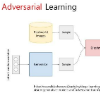Fairness and accountability are two essential pillars for trustworthy Artificial Intelligence (AI) in healthcare. However, the existing AI model may be biased in its decision marking. To tackle this issue, we propose an adversarial multi-task training strategy to simultaneously mitigate and detect bias in the deep learning-based medical image analysis system. Specifically, we propose to add a discrimination module against bias and a critical module that predicts unfairness within the base classification model. We further impose an orthogonality regularization to force the two modules to be independent during training. Hence, we can keep these deep learning tasks distinct from one another, and avoid collapsing them into a singular point on the manifold. Through this adversarial training method, the data from the underprivileged group, which is vulnerable to bias because of attributes such as sex and skin tone, are transferred into a domain that is neutral relative to these attributes. Furthermore, the critical module can predict fairness scores for the data with unknown sensitive attributes. We evaluate our framework on a large-scale public-available skin lesion dataset under various fairness evaluation metrics. The experiments demonstrate the effectiveness of our proposed method for estimating and improving fairness in the deep learning-based medical image analysis system.
翻译:公平和问责制是保健领域可信人工智能(AI)的两个基本支柱。然而,现有的AI模式在决定标识方面可能有偏差。为了解决这一问题,我们提议了一个对抗性多任务培训战略,以同时减轻和发现深层学习医学形象分析系统中的偏见。具体地说,我们提议增加一个针对偏见的歧视模块和一个预测基础分类模式中的不公平的重要模块。我们进一步强制实行一个正统性规范,以迫使两个模块在培训期间保持独立。因此,我们可以保持这些深层次的学习任务相互区别,并避免将其破落到一个单一的方块上。通过这一对抗性培训方法,弱势群体由于性别和肤色等属性而容易受到偏见的数据被转移到一个与这些属性相比中性的领域。此外,关键模块可以预测具有未知敏感属性的数据的公正分数。我们根据各种公平评估指标评估了我们关于大规模公共可获取的皮肤病数据集的框架。实验表明我们提议的估算和改进深层学习医学图像分析系统公平性的方法的有效性。




